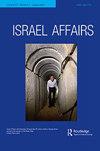以色列的时刻:国际社会支持和反对建立犹太国家,1945-1949
IF 0.6
4区 社会学
Q3 AREA STUDIES
引用次数: 0
摘要
正如他自己坦率地承认的那样。也就是说,根据提交人强调的信息,至少有一个一般性结论立即突出。尽管以色列迄今为止在防御伊朗及其代理人方面相当有效,通过不同类型的军事和情报行动对抗他们在短期内伤害国家的努力,但犹太国家迄今未能阻止他们稳步提升长期造成这种伤害的能力。尽管以色列迄今不时干扰伊朗的核计划和弹道导弹计划,但它未能阻止伊斯兰共和国在实现其最终目标方面取得进展:分别生产核武器和该武器的可靠运载系统。而且,尽管以色列不时打击真主党、哈马斯、巴勒斯坦伊斯兰圣战组织和其他伊朗代理人,但它未能阻止这些代理人继续提高其军事能力,特别是在他们对以色列本土发动火箭/导弹袭击的能力方面。简言之,伊拉姆的专著对以色列和伊朗的冲突提供了非常有用的介绍。任何对这场冲突感兴趣的人,无论是专业人士还是非专业人士,都一定会通过适当考虑自己的工作而受益。本文章由计算机程序翻译,如有差异,请以英文原文为准。
Israel’s moment: international support for and opposition to establishing the Jewish state, 1945–1949
as he himself candidly acknowledges. That said, at least one general conclusion immediately stands out on the basis of the information highlighted by the author. Whilst Israel has thus far been reasonably efficient in defending itself against Iran and its proxies, countering their efforts to harm the country in the short term through military and intelligence operations of different kinds, the Jewish state has thus far not been able to prevent them from steadily upgrading their capabilities to inflict such harm in the long term. Whilst Israel has thus far disrupted the Iranian nuclear and ballistic missile programmes from time to time, it has not been able to prevent the Islamic Republic from making progress towards achieving its ultimate objectives here: the production of a nuclear weapon and a reliable delivery system for that weapon, respectively. And, whilst Israel has battered Hezbollah, Hamas, Palestinian Islamic Jihad and other Iranian proxies from time to time, it has not been able to prevent these proxies from continuing to improve their military capabilities, particularly insofar as concerns their capabilities to launch rocket/missile attacks on the Israeli home front. Eilam’s monograph, in short, delivers a very useful introduction to the Israeli–Iranian conflict. Anyone with an interest in this conflict, professional or layperson alike, is sure to benefit by giving due consideration to his work.
求助全文
通过发布文献求助,成功后即可免费获取论文全文。
去求助
来源期刊

Israel Affairs
AREA STUDIES-
CiteScore
0.70
自引率
25.00%
发文量
65
期刊介绍:
Whether your major interest is Israeli history or politics, literature or art, strategic affairs or economics, the Arab-Israeli conflict or Israel-diaspora relations, you will find articles and reviews that are incisive and contain even-handed analysis of the country and its problems in every issue of Israel Affairs, an international multidisciplinary journal. Scholarly and authoritative, yet straightforward and accessible, Israel Affairs aims to serve as a means of communication between the various communities interested in Israel: academics, policy-makers, practitioners, journalists and the informed public.
 求助内容:
求助内容: 应助结果提醒方式:
应助结果提醒方式:


